Today Li Na Wins French Open – and in the process becomes First Asian Woman To Win a Grand Slam!
Here is a short report from Xinhua:
PARIS, June 4 (Xinhua) — History-making Li Na claimed the first-ever grand slam women’s singles title for China and Asia, beating defending champion Francesca Schiavone of Italy 6-4, 7-6 (7-0) in the French Open final here on Saturday.
Li Na, 29, became the 38th tennis player in the world to claim a grand slam singles title.
The triumph also raised Li Na from No. 7 to No. 4 on the WTA rankings.
“I felt today the dream came true,” said Li, who lay on the clay court after Schiavone fired the last shot out of the baseline. “When I was young, I dreamed about becoming a grand slam champion someday.”
While leading 6-0 in the tiebreaker in the second set, Li reminded herself to be cool.
“I kept telling myself: Okay, don’t do stupid thing. You need one point, and then you can get it,” Li said after the post-game press conference.
Even though her serve was interrupted by a shout from one of her supporters, the Asian top player kept her nerve to finish the clash with this point.
Li Na had already made history at the French Open, having been the first Chinese woman to advance to quarterfinals, semifinals and final.
In the Australian Open earlier this year, Li Na stunned the world as the first Chinese woman to be in a grand slam singles final.
Li said her Italian rival put up a good game.
“The opponent is very tough, and it’s a great game. At the last second when she hit the ball out, I really wanted to cry,” Li added.
Having far more direct winners than Schiavone, Li dominated the final with her powerful and sharp-angled strokes, breaking Schiavone’s third serve game in the first set and the first in the second set.
Schiavone, 30, a dark horse in last year’s French Open who had eliminated Li Na in the then third round, played with all her weapons, such as high-bounced serves, great volleys and spinning balls.
However, Li Na’s fast pace and attacks made Schiavone difficult to effectively change tactics.
Thanks to Li Na’s unforced errors, Schiavone broke Li’s fourth serve game to tie the score 4-4 in the second set.
From 5-5 to 6-6, the game was interrupted several times by the umpire who checked whether the ball was in or out. In the tie-breaker, Li Na stormed to an unbelievable 7-0 win.
Here are some photos.

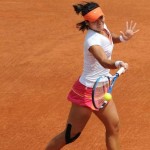
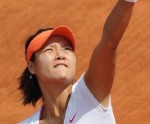
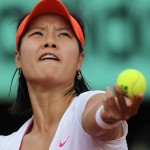
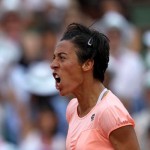
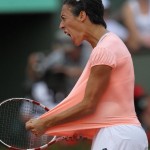
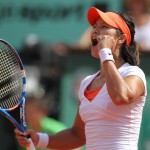
YinYang says
Match recap on Chinese TV:
TonyP4 says
Behind this big win, there are many soul searching.
* Chinese training system will not do good for tennis and possibly for golf. Hitting a thousand balls a day is over-trained.
* Chinese do not have enough good coaches in tennis. Using badminton or table tennis training techniques most likely do not hold well. The next generation of coaches will be from the retired tennis players of today, so the future is bright.
* Chinese fans have a lot to learn and should not be the ‘amateur’ coaches that have a lot to do with the loss of Australia Open and some blame on the Olympics game for Li Na.
We depend on foreign training, system and coaching today. They’re constructive criticism. We’re in a learning stage and if we do not learn, we will never go to the next level.
—–
* She should have won it easily if she went to 4-1 instead of 3-2 in the second set.
* She should be in the top 3 world rank with two Grand Slam finals and one win.
* Her last losses since Australia Open indicates that tennis is more a mind game.
* The next win will not be easy: 1. she should have passed her prime for her age, and 2. currently most top rank players are either injured or just retired.
* It seems Chinese female players esp. in tennis and golf are better adapted than male counter parts.
Jason says
http://www.youtube.com/watch?v=OVstViusa_w
Look at 3:33 when a CCTV reporter is more excited than Li Na. Hilarious.
kchew says
The fact that China is very successful in ping pong and badminton does point out that the Chinese training system is not the problem. My view is that the relative lack of progress in tennis is due to the lack of top coaching staffs. However, with the success of Li Na and a few other players, this deficiency will be overcome in the near future. More Chinese will have exposures to latest tennis training techniques.
While Li Na success is ground breaking and a source of admiration (given that China achieve success in a sport that is dominated by the Westerners), we should not overlook the accomplishment in other racket sports, particularly badminton and table tennis. Badminton, in particular, enjoys much more support and active participants in China and Asia, should not be neglected, just because of the success of Li Na.
The problem in Chinese sporting world is the lack of progress in contact sports. This is something that has to be addressed. Perhaps the lack of organised grass root sport organisations, disdain for contact sports in fear of injuries, lack of proper facilities (like playing fields etc) and absence of top coaches contributed to this dismal affair.
Charles Liu says
Not sure what kind of support tennis gets in China, but read that Li Na had quit tennis to go to college. Imagine had she stayed with it.
raventhorn2000 says
I think Li Na’s coming back to tennis only shows her maturity.
There is a trend nowadays that the best tennis players are older, more seasoned, and more matured, like in Li Na’s case.
Too often, we have seen young atheletes in sports because they were almost forced into it by their parents. No doubt some of these young people do love the sports, but I think they are also prone to early burn-outs.
Older atheletes, especially those who experienced non-sports life and then came back to sports, tend to stay in the sport longer, because they came back as their own choice and made a matured decision to devote their lives to the sports.
I think Li Na should be an inspiration to older atheletes, that they can still accomplish great things, their advantage is in their experience and their maturity.
TonyP4 says
China’s system in sports is no good for tennis and golf, but is good for other sports like gymnastics, diving… They need to be trained at an early age and most Chinese today do not have the money to develop promising kids.
Look at China’s soccer system and you’ll find so many problems. The love of money is the root of all their problems.
Chinese only have tennis in last decades. Tennis requires expensive courts for a few compared to table tennis. China today do not have a clay court and it makes Li’s win even better.
The strategy of deep return reducing her opponent’s spin works. I do not know it is her idea, her husband’s idea, or the coach’s.
Shi says
You need to fix the title. It is false:
“First Asian Woman To Win a Grand Slam”
Li might be the first Asian Woman to win a SINGLES grand slam, but there are other Asian women who have won Grand Slam titles years before her. Ai Sugiyama has won the French open, AND Wimbledon AND the US open. Heck, Sawamatsu won a Wimbledon title before Li was even born!
So no, Li is NOT the first, or even second Asian Woman to win a grand slam.
Allen says
@Shi #8,
Thanks for the correction. I guess I should have been more specific saying that I mean Grandslam singles, not Grand Slam doubles – by an Asian-born player. Still, I see a lot of titles like mine in English, and I wonder if it’s ignorance – carelessness (like me) or something else.
When I wrote the title, I had in my mind a prize that is awarded wholly to an Asian. Ai Sugiyama did win 3 doubles titles, but she won with European partners (1 with Frenchwoman Julie Halard-Decugis and 2 with Belgian Kim Clijsters). Sawamatsu did win the Wimbleton doubles in 1975, but that was with Amercan-born (and American citizen) Ann Kiyomura.
So yes, you are right. But Li Na’s accomplishment is notable that it is first grand slam won wholly by an Asian, born in Asia, of an Asian nationality. For all these reasons, I will retain the title I used.
Thanks though for your comment though.
PTS Terbaik says
Good Information
Regards : Unissula